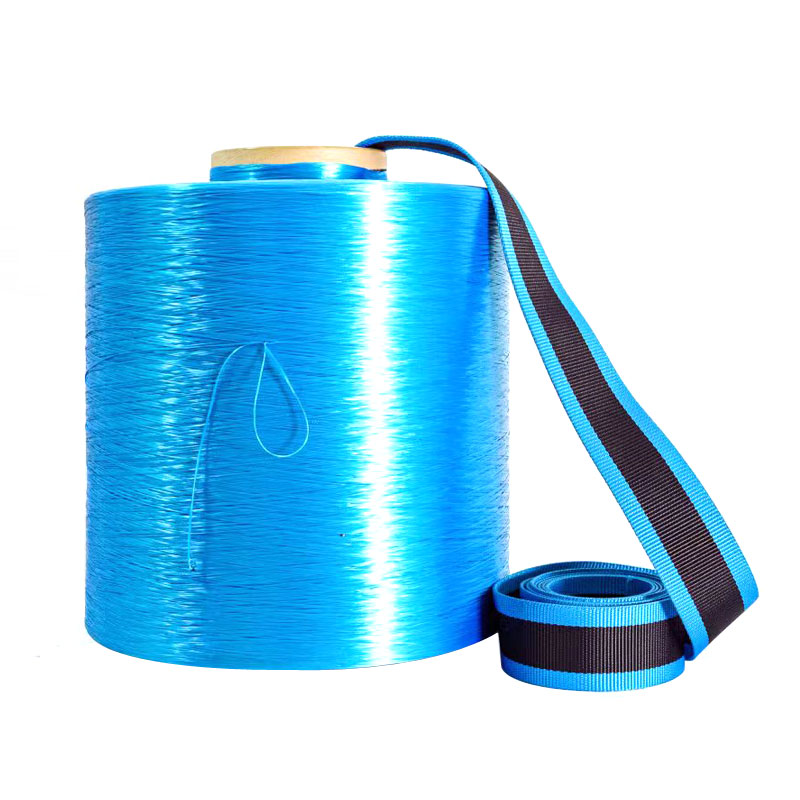Why is Polyester Industrial Yarn Revolutionizing Various Industries?
2024-12-18
In today's fast-paced and ever-evolving industrial landscape, innovation in materials plays a crucial role in enhancing efficiency, durability, and performance. One such material that has seen significant growth and adoption across a variety of sectors is polyester industrial yarn. But what makes this seemingly simple material so valuable in industrial applications? Let's explore why polyester industrial yarn is becoming a game-changer across multiple industries.
What is Polyester Industrial Yarn?
Polyester industrial yarn is a high-performance fiber made from synthetic polyester, which is derived from petrochemicals. This yarn is produced through a process of spinning polyester fibers into a continuous thread, which can be woven, knitted, or braided into different forms to serve a wide range of industrial purposes. Known for its strength, durability, and versatility, polyester yarn is increasingly being used in everything from textiles and construction materials to automotive and filtration systems.
Why is Polyester Industrial Yarn So Popular?
1. Exceptional Durability and Strength
One of the most compelling reasons behind the popularity of polyester industrial yarn is its exceptional durability. Polyester is inherently strong, resistant to wear and tear, and has excellent tensile strength. This makes it ideal for industrial applications that require materials to withstand harsh environments, constant use, and significant pressure. For example, polyester yarn is used in the production of industrial fabrics that need to endure heavy-duty conditions such as conveyor belts, tarpaulins, and upholstery.
2. Weather and Chemical Resistance
Polyester yarn is highly resistant to moisture, UV rays, and chemicals, making it an excellent choice for outdoor applications. Unlike natural fibers, polyester does not degrade or weaken when exposed to water, and it resists the damaging effects of sunlight, which can cause fading and material breakdown. Additionally, polyester is resistant to a variety of chemicals, including oils and solvents, making it a versatile material in industries like automotive manufacturing, chemical filtration, and marine applications.
3. Cost-Effectiveness
Polyester yarn is relatively inexpensive to produce compared to natural fibers like cotton or wool, as well as many other synthetic alternatives. This makes it a cost-effective solution for manufacturers, especially those in industries that require large quantities of material. Whether it's for industrial sewing, rope production, or upholstery, the affordable price of polyester industrial yarn allows companies to keep their costs down without sacrificing performance or quality.
4. Versatility Across Industries
The versatility of polyester industrial yarn is one of its strongest attributes. It finds applications across a wide range of industries, including:
- Textiles: Used in making durable fabrics for clothing, upholstery, and outdoor gear.
- Automotive: Used in seatbelts, airbags, and interior upholstery, where strength and reliability are paramount.
- Construction: Polyester yarn is used in ropes, nets, geotextiles, and reinforcement materials in construction projects.
- Filtration: Polyester yarn is a key material in the production of filter fabrics used in water treatment, industrial filtration, and air filtration.
- Marine: Polyester is commonly used in ropes, sails, and tarps, thanks to its resistance to water and UV degradation.
5. Lightweight and Flexible
Polyester industrial yarn is not only strong but also lightweight. Its flexibility and lightweight nature make it easy to handle and process, especially in applications that require intricate weaving or braiding. This is particularly useful in sectors like textiles, where the yarn must be both lightweight for comfort and strong enough to withstand daily wear and tear.
Sustainability and Polyester Industrial Yarn
While polyester yarn has numerous advantages, there is increasing concern about the environmental impact of synthetic fibers, especially when it comes to plastic waste. However, innovations in recycling technology are making polyester a more sustainable option. Recycled polyester yarn, made from post-consumer plastic bottles or waste fabric, is becoming more widely available. This helps reduce the environmental footprint of polyester yarn and contributes to the growing trend toward circular economy practices in industrial production.
Moreover, many manufacturers are focusing on eco-friendly production processes that reduce energy consumption, water use, and carbon emissions, helping to mitigate the environmental impact of synthetic fibers.
Conclusion: Is Polyester Industrial Yarn the Future of Industrial Materials?
Polyester industrial yarn’s combination of strength, versatility, weather resistance, and cost-effectiveness has cemented its place as an essential material in a variety of industries. Whether in the automotive sector, construction, textiles, or filtration, polyester yarn offers unmatched performance at a fraction of the cost of alternative materials. As technology continues to advance, we can expect to see even more sustainable versions of this material, further enhancing its role in modern manufacturing.
In a world where industries are constantly looking for efficient, durable, and affordable solutions, polyester industrial yarn is poised to remain a key player for years to come. While it may not be the most glamorous material, its practical applications and exceptional qualities make it an indispensable asset to the modern industrial world.



